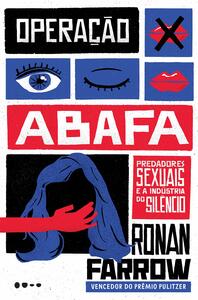You need to sign in or sign up before continuing.
Take a photo of a barcode or cover
While the book does a very good job at highlighting the atrocities committed by powerful men in Hollywood and NBC, I felt the book went on too long. I do think it’s important, however, to illustrate how difficult it was for Ronan Farrow to get this very important story out to the press. It’s sad that these powerful men have so much sway over the media. I found this book to be insightful and heartbreaking.
I think I would have liked it better if I had more background on the story
challenging
dark
informative
fast-paced
I first heard about this book five years ago when Farrow was on Stephen Colbert promoting it. So when I decided to try to read more nonfiction this year, it was at the top of my list. 4 months of library hold waiting later, I am frothing at the mouth to tell everyone about it.
This book dives deep into Farrow's experiences investigating and reporting on the sexual assault allegations against Harvey Weinstein and the chain reaction that report set off in Hollywood. Farrow pulls no punches in recounting the survivors' accounts of the assaults and the endless efforts people in power went to to prevent those stories from getting out.
If this wasn't nonfiction, it would read like a spy thriller. Because there were actually spies involved! Spies, cover-ups, payoff deals, NDAs. Journalists being followed, harassed, threatened, silenced. Things you don't think happen anymore, or happen at all, outside of a movie script. But espionage and corporate intimidation are alive and well, I'm afraid, and they are harrowing to read about.
If you want a page-turning nonfiction read that doesn't pull its punches in describing the dark side of Hollywood, I would highly recommend Catch and Kill.
This book dives deep into Farrow's experiences investigating and reporting on the sexual assault allegations against Harvey Weinstein and the chain reaction that report set off in Hollywood. Farrow pulls no punches in recounting the survivors' accounts of the assaults and the endless efforts people in power went to to prevent those stories from getting out.
If this wasn't nonfiction, it would read like a spy thriller. Because there were actually spies involved! Spies, cover-ups, payoff deals, NDAs. Journalists being followed, harassed, threatened, silenced. Things you don't think happen anymore, or happen at all, outside of a movie script. But espionage and corporate intimidation are alive and well, I'm afraid, and they are harrowing to read about.
If you want a page-turning nonfiction read that doesn't pull its punches in describing the dark side of Hollywood, I would highly recommend Catch and Kill.
Wow wow wow. Incredible reporting, essential reading.
dark
emotional
informative
mysterious
reflective
sad
tense
fast-paced
Graphic: Misogyny, Rape, Sexism, Sexual assault, Sexual violence, Stalking, Gaslighting, Sexual harassment, Injury/Injury detail
Moderate: Incest, Pedophilia
Minor: Suicide attempt
Thank you Ronan Farrow for writing this and sticking with the reporting despite the barriers. I remember seeing Ronan Farrow occasionally on the Today show, as they were often more "hard hitting" pieces for a morning now. I remember then watching the Weinstein story break and Ronan appearing on GMA. It was curious that this was taken to another network, let alone another form of journalism - through The New Yorker. It was increasingly frustrating reading the barriers that he faced with NBC in reporting this story. The hours and stories that he and Rich McHugh (NBC producer) only to be faced with road blocks. The majority of the book is the exposure of Weinstein, however it does get into Trump and Lauer as the "Catch and Kill" journalism is exposed - the purpose of catching a story, only to kill it, in some cases just to have the power over someone. This is a well researched piece of work and was defiantly worth of the Pulitzer Prize.
adventurous
dark
informative
fast-paced
Thrilling in a way that's very rare in nonfiction books. Farrow is a top tier investigator and writer
Moderate: Sexual assault
dark
emotional
informative
reflective
sad
medium-paced
Its sad how this has been going on for a long time and no one would listen or help the women knowing what they said and had seen themselves. Sad its still going on.. Thank God for people like Ronan Farrow and James Patterson. They dont give a shit who they piss off, they are going to put it out there and name names.




